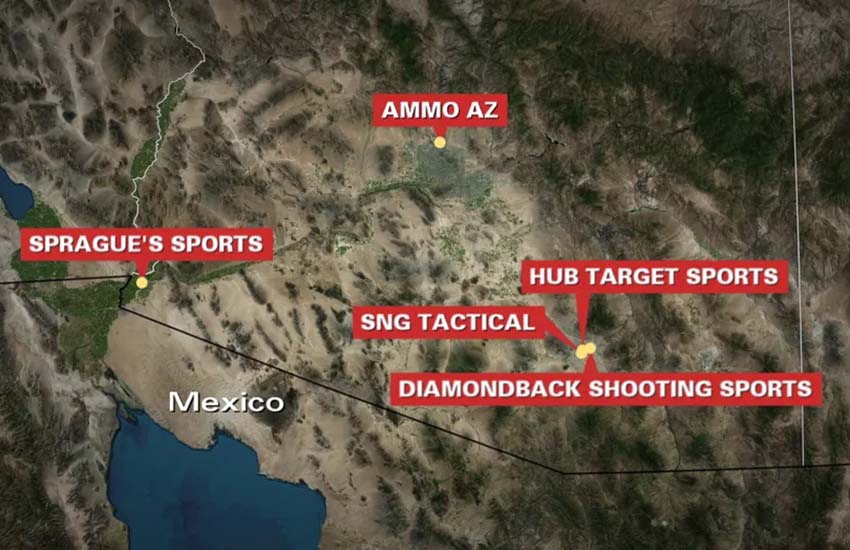Just over a week after its case against United States gun manufacturers was dismissed, the federal government has filed a lawsuit against five gun stores in Arizona, accusing them of involvement in illegal arms trafficking to Mexico, where firearms are used to commit tens of thousands of homicides annually.
The Ministry of Foreign Affairs (SRE) said in a statement that the government filed the suit in a U.S. federal district court in Tucson on Monday.
Three of the accused stores are in that city. Another is in Phoenix and the fifth is in Yuma, located just east of the border crossing between Andrade, California, and Los Algodones, Baja California. Mexico is seeking unspecified monetary damages from the stores and demanding that they hire independent monitors to ensure compliance with gun purchase laws.
The SRE said that the government’s lawsuit alleges that the five stores “routinely and systematically participate in the illegal trafficking of arms, including military-style ones, for criminal organizations in Mexico through sales to straw purchasers and sales directed to arms dealers.”

“The lawsuit points out that the five stores are among the vendors in Arizona whose weapons are recovered with greatest frequency in Mexico,” the ministry added.
The stores named in the suit are Diamondback Shooting Sports, SNG Tactical and The Hub Target Sports – all in Tucson – as well as Ammo AZ in Phoenix and Sprague’s Sports in Yuma.
Alejandro Celorio Alcántara, the SRE’s legal advisor, said the government chose to name “the five worst stores” for illegal trafficking in the United States, where a recently enacted federal law defines straw purchasing as a crime. The law stipulates sentences of up to 25 years if the offense is related to drug trafficking.
“They are not careful when they sell products, so they allow straw purchasers to buy guns,” Celorio said, adding that the stores have sold multiple weapons on multiple occasions to some buyers.
“We are saying they are negligent and facilitate straw purchasers, to the point of being accomplices,” he said.
The official said that criminal probes in the U.S. had traced weapons purchases to the five stores named in the lawsuit. There was evidence that they didn’t file all the required information when making some sales, he said.
“The main argument of our lawsuit is that these businesses are an organized part of a criminal enterprise, a mechanism to facilitate criminals and cartels in Mexico being able to use their weapons,” said Celorio.
He acknowledged that the first hearing related to the lawsuit might not occur until the summer of 2023.
The SRE said in its statement that the litigation against the stores is part of a “multifaceted strategy of the government of Mexico to stop the avalanche of weapons, particularly assault weapons, from the United States.”
The weapons, it added, “empower criminal groups, cause bloodshed in Mexico and contribute to the trafficking of drugs to the United States.”
The judicial action in no way questions the constitutional right of U.S. citizens to carry arms nor the right of gun stores to sell their products responsibly, the SRE said, noting that its lawsuit is the first such civil action filed by a national government against U.S. weapons vendors. It said that the suit sets out “various arguments,” including that the stores violate their duty of care, use “deceitful and biased” advertising, sell guns that can be converted into automatic weapons and “violate state and federal laws” in the U.S. – conduct that “causes tremendous harm in Mexican territory.”
The lawsuit’s filing came 10 days after a Massachusetts federal judge dismissed the Mexican government’s case against U.S. gun manufacturers, which were accused of negligent business practices that led to illegal arms trafficking and deaths in Mexico, where U.S.-sourced firearms are used in a majority of high-impact crimes. The SRE said it would challenge Chief Judge F. Dennis Saylor’s ruling. U.S. law “unequivocally” prohibits lawsuits that seek to hold gun manufacturers responsible when people use their products for their intended purpose, Saylor determined.
In its latest statement, the ministry said that a favorable sentence in Arizona would support the lawsuit in Boston as “it would prove that the manufacturing companies are negligent by not monitoring or disciplining vendors that sell their products.”
“… The government of Mexico is confident that both the Boston lawsuit against manufacturers and the Arizona lawsuit against vendors will succeed,” it said. “The actions undertaken by Mexico have already contributed to promoting conversations and actions around the world to stop the trafficking of weapons as well as the dangerous practices of the arms industry.”
With reports from AP
